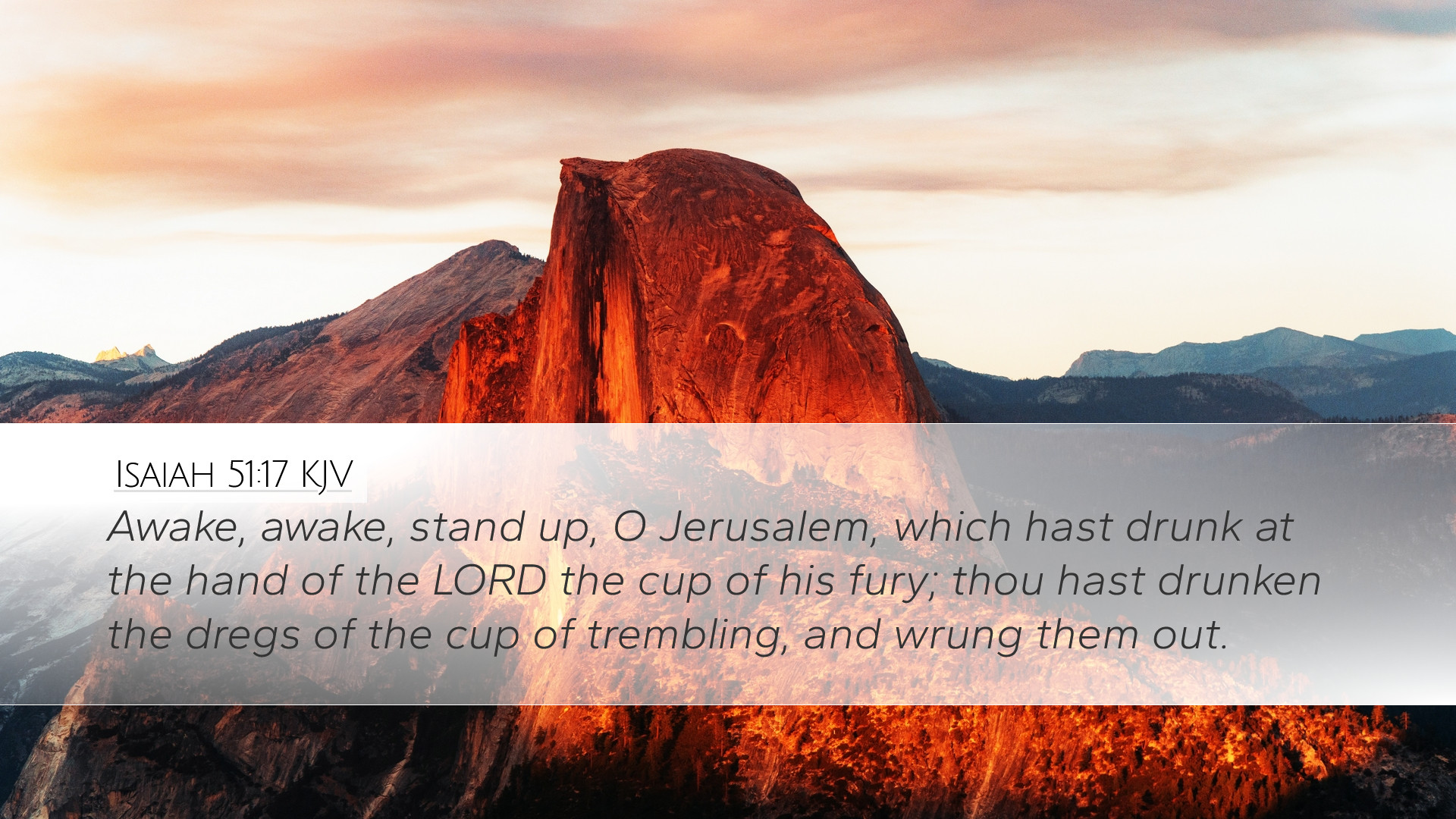Bible Commentary on Isaiah 51:17
Verse Context: Isaiah 51:17 states, "Awake, awake! Stand up, O Jerusalem, which hast drunk at the hand of the Lord the cup of his fury; thou hast drunken the dregs of the cup of trembling and wrung them out." This verse calls Jerusalem to awaken from its spiritual stupor and recognize the consequences of its iniquity.
Exposition and Analysis
Matthew Henry's Commentary: In his reflections, Matthew Henry emphasizes the urgency of God's call for Jerusalem to "awake." He interprets this as an admonishment to recognize their suffering as a result of divine judgment. Jerusalem, representing the people of God, is depicted as having experienced considerable anguish—symbolized by the "cup of his fury." This phrase suggests the wrath of God, a theme prevalent throughout Scripture, portraying the serious consequences of forsaking His Law.
Henry also points out the significance of "drinking the dregs of the cup." He clarifies that this imagery illustrates not just any suffering, but the complete and utter devastation that follows prolonged disobedience to God. The "dregs" represent the bitterness of the final remnants of judgment, suggesting that Jerusalem has fully tasted the results of their transgressions. Consequently, Henry encourages the reader to meditate on their own lives, urging them to avoid similar fates through obedience and repentance.
Theological Insights
Albert Barnes' Commentary: Barnes delves into the deeper implications of this verse, examining the nature of God's discipline. He identifies the "cup of trembling" as a metaphor for trial and judgment, asserting that God's people cannot escape the consequences of their actions. He highlights that the call to "awake" signifies a need for national repentance and restoration.
Moreover, Barnes articulates that this passage serves to remind the faithful of God's sovereignty, even over the trials they face. He reassures readers that despite the painful circumstances, God remains a source of hope and redemption. This verse, while confronting, is also an invitation for reflection and renewal. Barnes implores pastors and scholars to communicate the balance between divine judgment and divine mercy, illustrating that while God may discipline His people, He also extends His hand for restoration.
Calls to Action
Adam Clarke's Commentary: Adam Clarke offers a more personal interpretation of the verse, underscoring the call to individual believers within the collective community of Jerusalem. He posits that the "awakening" mentioned is not merely for Israel as a nation, but also for each person who makes up the body of believers. Clarke notes that the use of imperative language ("Awake, awake!") suggests an active response is required from believers, to rise from complacency and recognize their dire spiritual state.
- Recognition of Sin: Clarke emphasizes the need for self-examination. Believers are encouraged to identify and repent of personal transgressions that contribute to the collective sin of the community.
- Understanding Tribulation: Clarke expounds on the nature of trials and calamities, asserting that these experiences serve as catalysts for spiritual growth and deeper reliance on God.
- Hope and Restoration: Lastly, Clarke points to the redemptive promise inherent in God's call for awakening. He reassures readers that through humility and genuine repentance, they may experience God's mercy and transformative power.
Conclusion
In summary, Isaiah 51:17 serves as a poignant reminder of the necessity for believers to awaken from spiritual lethargy and recognize the implications of their actions. Insight from Matthew Henry, Albert Barnes, and Adam Clarke collectively illustrates the themes of divine judgment, the call for repentance, and the promising hope of restoration. This passage challenges pastors, students, and theologians to reflect on both the serious nature of sin and the profound depth of God’s mercy.
The overall message encourages individual and communal reflection, urging a pursuit of righteousness that seeks to align the hearts and minds of God's people with His divine will. It appeals to the core of Christian discipleship—the constant cycle of recognizing our failures, repenting, and leaning towards the grace and love of God for renewal.


